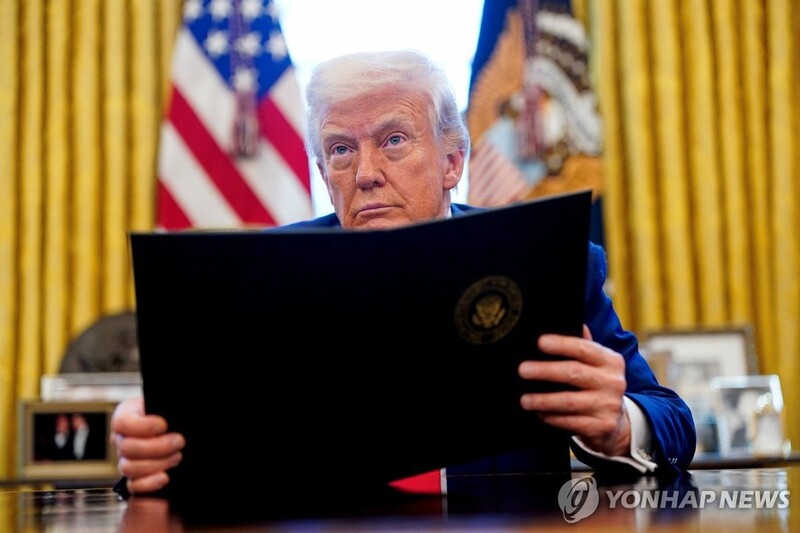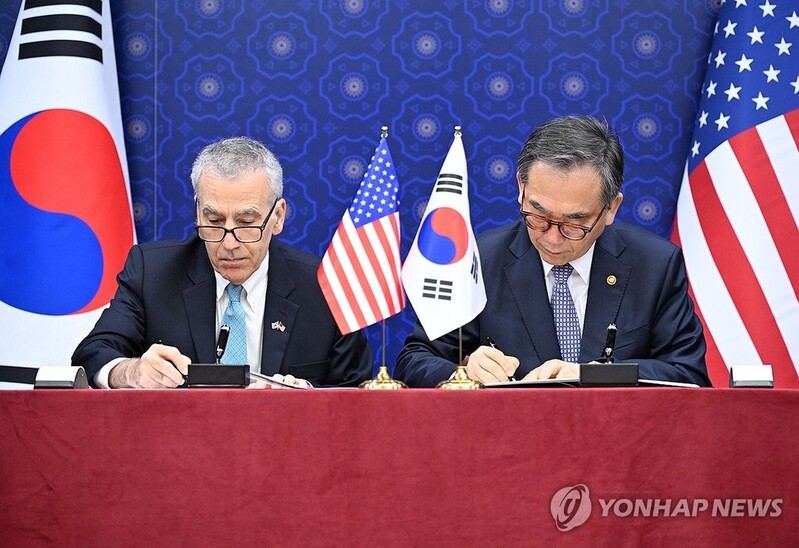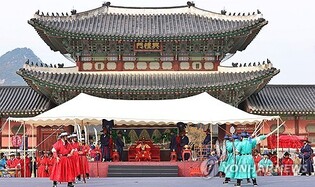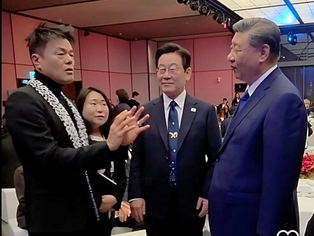 |
| ▲ This Reuters photo shows U.S. President Donald Trump as he signs executive orders and proclamations in the Oval Office at the White House in Washington, D.C., on April 9, 2025. (Yonhap) |
 |
| ▲ Foreign Minister Cho Tae-yul (R) and then U.S. Ambassador to South Korea Philip Goldberg sign the Special Measures Agreement on determining Seoul's share of the cost for the upkeep of the 28,500-strong U.S. Forces Korea, at the foreign ministry in Seoul on Nov. 4, 2024, in this file photo provided by the ministry. (PHOTO NOT FOR SALE) (Yonhap) |
(News Focus) S Korea-Trump tariffs
(News Focus) Experts call for prudent, guarded approach to Trump's proposed 'package deal'
By Kim Seung-yeon
SEOUL, April 10 (Yonhap) -- South Korea should take a prudent and guarded approach in its negotiations with the Trump administration over his proposed "package deal" on tariffs and security issues, as it would be better not to hastily respond to such talks under Seoul's current acting leadership, experts said Thursday.
Experts said South Korea needs to carefully consider what it can offer to the United States and secure from it in return, such as stronger U.S. security commitment, as Trump has announced a 90-day pause on its "reciprocal" tariffs on South Korea and others.
Trump suggested Wednesday (U.S. time) that his administration will put other security and non-tariff issues all on the table, saying that reducing American troops abroad, like in Europe and South Korea, can be "part of" the negotiations.
His remarks added to growing speculation that Washington under his command could bring up the defense cost-sharing agreement as a condition for the tariff negotiations with Seoul.
"Under the current acting presidency, and with the tariff pause, the priority should be to clearly assess U.S. intentions and lay the groundwork so that the next government can respond strategically," Yang Uk, a research fellow at the Asan Institute of Policy Studies, said.
He said Trump's tariff salvo may be an opportunity for South Korea to secure more meaningful security commitments from the U.S. in deterring North Korea's military threats.
"The fact that North Korea's nuclear threats have reached a new level is the most pressing issue for us. We could ask for in return, for example, the U.S. to consider redeploying U.S. tactical nuclear assets to South Korea, to boost our defense," he said.
Trump's remarks came after his first phone talks with acting President Han Duck-soo on Tuesday, during which he said they discussed Seoul's "payment for the U.S.' big time military protection" and the "confines and probability" of a deal for both countries that are "not covered by trade and tariffs."
Some experts argue that South Korea should consider accepting a higher share of defense-sharing costs if the Trump administration moves to overturn the finalized agreement and push for a new deal.
In October, Seoul and Washington struck the Special Measures Agreement (SMA), under which Seoul is to pay 1.52 trillion won (US$1.03 billion) next year for the stationing of the 28,500-strong U.S. Forces Korea (USFK), up from 1.4 trillion won this year.
Trump has referred to South Korea as a "money machine" and, as a presidential candidate, said that if he were in the White House, the U.S. ally would be paying significantly more for its defense.
Seoul's position has now become increasingly precarious as Trump has made the issues of cost-sharing and troops presence more explicit.
"Since Trump doesn't always stick to the traditional frameworks, his unpredictability could work as an advantage and potentially lead to a stronger security outcome for South Korea," Yang said.
While South Korea has expressed a willingness to discuss economic cooperation, such as shipbuilding and potential participation in the U.S.' envisioned Alaska liquefied natural gas pipeline project, it has maintained that the defense burden-sharing deal is a settled matter and a separate issue from the tariff negotiations.
"As a shift in policy direction could create new problems, it would be strategically wise to hold off on the defense cost-sharing issue until the new government comes in," Jo Bee-yun, a research fellow at the Sejong Institute, said.
South Korea will hold an early presidential election on June 3, following the ouster of former President Yoon Suk Yeol over his martial law attempt.
Jo noted that the succeeding government could highlight the presence of American troops in South Korea in the context of deterring China's assertiveness in the region, including the Taiwan Strait.
"The government should clarify its stance on China, and particularly Taiwan, and highlight that it also contributes to the U.S. deterrence in countering Beijing in the region," Jo said.
Yang of the Asan institute said it's important to gauge what the U.S. wants from South Korea in the broader effort to counter China.
"To what extent South Korea can cooperate in this regard will be key to the relationship with the U.S.," he said.
On Wednesday, the foreign ministry reaffirmed that South Korea has contributed to the stable USFK presence through its "steady increases" in the defense cost-sharing.
"We intend to continue to enhance these efforts and will actively explain our position to the U.S. side, and seek dialogue and cooperation," the ministry said.
(END)
(C) Yonhap News Agency. All Rights Reserved























